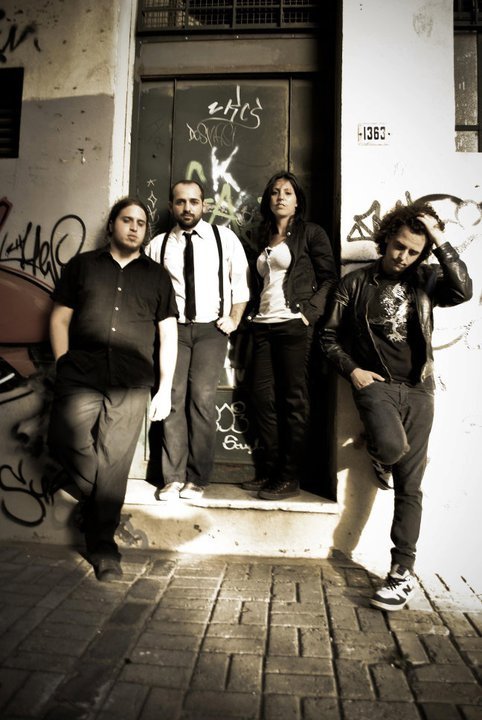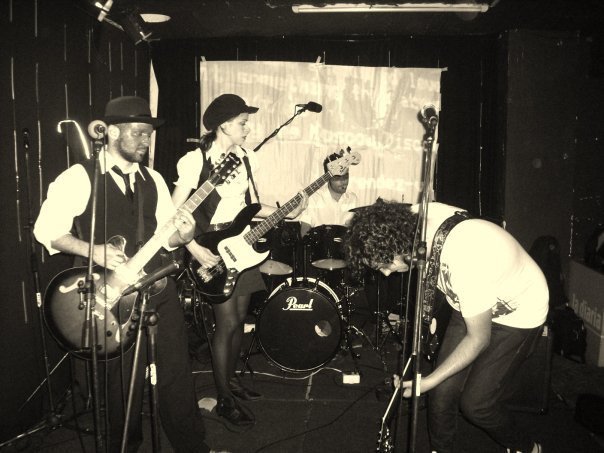In one of the poems he wrote during the final phase of his literary career, W.B. Yeats defined the inspiration which drives artists as the appetite for the apple in the bough that is the furthest away from reach. I find no better allegory for the musical vision of the many Uruguayans who hold both British and American performers as ultimate role models. The difficulties they have to face the moment they decide to make music in English in what is a Spanish-speaking country are tantalizing, including a coma-inducing lack of airplay and a barrage of misconceptions regarding what they really want to do. Onlookers claim that they are selling out, that they have no respect for Uruguayan culture, that they are posh bastards… nobody minces words. They are called all kinds of things.
There is one thing they are seldom called, though.
They are not called people with the ability to cast their aspirations beyond the logical barriers of the context they live in, and with the endurance to follow such aspirations wherever they might take them, and whichever obstacles they might end up facing. Which I think we have to agree is the truest sign of strength – the person who falls and picks himself up constantly is by far stronger than the one who never falls down.
I have already covered many artists who have chosen to sign in English in this country. Having written in English my whole life (and having gone as far as to publish a book of lyric poetry in English in Uruguay, no less) I’m naturally interested in what they do. If you read the blog frequently, you know the reviews I write about such bands usually revolve around the same set of considerations – while I profess a larger or lesser sympathy for what they do, I also tend to have reservations about how they do it. Sometimes I criticize their over-reliance on specific bands (to the point they end up sounding like cheap imitators), and other times the lyrics make me just disgruntle owing to the grammar violations and disregard for British/American naturalness they evidence. But I mainly end up the coverage of such artists remarking how much I appreciate what they intend to do, which is nothing short of an Herculean task: making people understand that one will go as far as his ability to dream and stand for these dreams can go, that only then can monotony be overtaken. Notwithstanding which shortcomings I might (or not) perceive, I always conclude that these bands are transcendental simply because of the motivational role they do play for people who have the certainty there’s something more to life than what the eye can see.
The Blueberries is a band that certainly does. Led by Ernesto Pasarisa (who sings, plays guitar and composes the songs performed by the band), they became publicly-known when they were nominated for a Graffiti Award for “Best Alternative Pop Album” just a couple of months ago. But the story of the band actually went a long way back, more precisely to the year 2007 when it was founded by Ernesto and some good friends to keep the music and essence of artists like The Velvet Underground, Bob Dylan, The Beatles, The Who, The Kinks, The Hives, The Libertines, The Strokes, The Moldy Peaches, Oasis and Blur well alive. Over the course of the years, they settled on their actual line-up which comprises Ernesto on lead vocals and guitar, Santiago “Saji” Jaureguy on guitar and backing vocals, Virginia Álvarez on bass and Fede Hell on drums. An indie band at heart, The Blueberries recorded a self-titled album that they chose to make available as a free download on their own site. It was produced by Max Capote, and mastered by Juan Branaa.
As regards the way in which the band chose to market their music, this is what Saji recently told a Uruguayan portal:
“The dream of many an artist is to see his album on the racks of stores, and to be supported by a record company which has contacts along with logistic and marketing resources. That sounds quite tempting, but the truth is there are very few people willing to make an investment on emerging artists. Right now, everything revolves around placing an album in a rack and little else. If the album is successful, you will become best friends with the owner of the record company, and he will take your calls. If not (and that is something lots of bands we know can attest to) you will be moved down the pecking order, and nobody will lift a finger for you. And the thing is, few are willing to take a risk – the cost of recording an album is on the artist/band, and so is the cost of pressing it. Yet, the label is the one taking up to 80 % of what is earned just by placing it on a store.”
Thus, the band chose to make their debut album freely available to whomever wished to get it. And Ernesto wrote about 200 personalized emails introducing the band to radio stations, bloggers and the press. That’s how I became acquainted with their music.
Their music… just two paragraphs above you read a list of the artists the band holds in high esteem. And somehow they have managed to arrive at a very balanced equation on their debut album. Heralded by the twangy, nervy riff of the contagious “London Eye” (a single on its own right), the album has moments of true in-yer-face garage music and (to quote Tom Petty) pretty much of “anything’s that rock & roll” such as “Another Sunny Afternoon” and “Hold On”. And the band’s more temperate side carries along songs like “Empty Promises” and “Vulnerable”, a great combo that sends off an album which is basically a very clear statement of purpose.
You see, an inherent shortcoming of some very popular Uruguayan bands is their insularity. I’m talking about artists which are not nurturing in the sense they don’t really make people want to learn about other music. Regardless of how enjoyable some of their songs are, it is frustrating to come across fans who claim they are the greatest bands ever, and who are incapable of listening to other artists – and in many cases, that includes the ones who actually inspired the bands they follow so ardently to begin with. That is a dangerous position for a listener to find himself into. Echoing Goethe’s belief that he who is not acquainted with a foreign tongue ignores his own, then the one who has no true understanding of diverse and different music is effectively self-deprived of the chance to realize why his favorite bands actually mean so much to him.
That is a pitfall that many Uruguayan artists face, notwithstanding how engaging their music is on its own terms. Bands like Soundays, Casablancas and The Blueberries are here to remind us that music is first and foremost fueled by ideals, and that these ideals are what make artistic continuity viable. Should these ideals become circumscribed then they face an imminent oblivion. And while younger generations will still know all that has come before, they will never be able to understand it. The fights, the struggles and the successes will become lost in translation. And starting again and again from square one means that the destination will never be reached. Or descried, which I think is the proper sense of any journey – it is always preferable to travel full of longing than to arrive at your destination.
In the end, I must say I’m honestly thankful for the presence of bands like The Blueberries, and all the Uruguayan bands that I have already reviewed on MusicKO that to some extent or the other have tried to directly make people aware of the musical radiance that began suffusing the whole wide world in the late ’60s. However critical I was of some of the earliest Uruguayan Brit bands, now I can vividly see the role they played all along. I really abhorred Astroboy and Boomerang back in the day, but in hindsight I can realize they were more a benign virus than anything else. They stood as the preliminary form of something that could but gain focus and sustainability over time.
Pete Townshend (a name that summarizes the biggest idealism rock music has been bestowed with) once wrote that we must have “faith in something bigger” to carry on for as long as it takes. A composition like “1969 Girl” might come across as stomping good fun, or it might pass you coldly by. You might like a song such as “London Eye” or not. You might think the world of “Vulnerable”, or think it is a mundane composition. That is all allowed. But denying how much these songs can connect listeners with the time and age in which the seeds of music as something higher and stronger were sowed is simply an injustice. As Marketa Irglova said when receiving her Academy Award for “Falling Slowly” (one of the biggest triumphs of independent music ever)… “fair play to those who dream”.
Fair play to all them.
Fair play to those who keep the faith alive.
This is The Blueberries’ official website. This is their ReverbNation profile.


